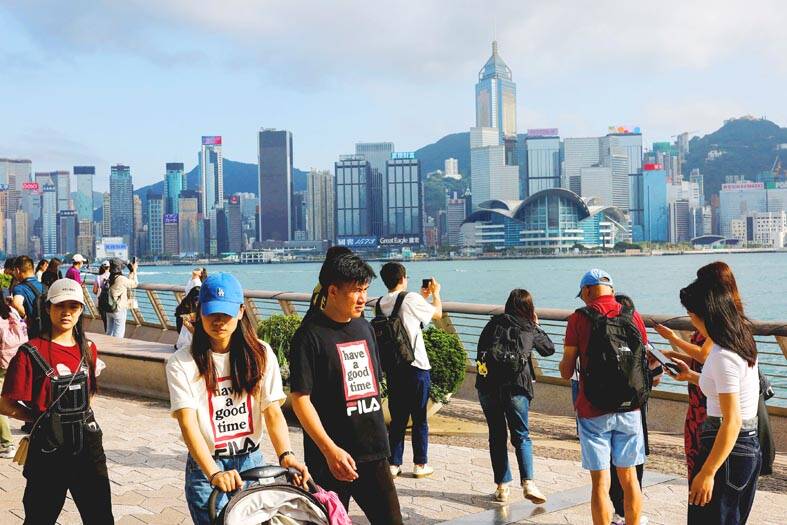Hong Kong journalists rated the territory’s press freedom lower than ever in an annual survey released yesterday, citing fears of sweeping national security laws.
Published every year since 2013 by the Hong Kong Journalists Association (HKJA) and the Hong Kong Public Opinion Research Institute, the Press Freedom Index ranks the territory’s media environment on a scale of zero to 100 — 100 being a perfect score. It is based on a poll of more than 250 working journalists and about 1,000 members of the public.
The rating this year among journalists dropped to a record low of 25, down 0.7 points from last year and 17 points from the survey’s launch.

Photo: Reuters
More than 90 percent of the surveyed journalists said that Hong Kong’s press freedom was “significantly” impacted by a new security law enacted in March, which punishes crimes such as espionage and foreign interference.
Colloquially known as Article 23, it was the second such law enacted for the financial hub, following one imposed by Beijing in 2020 after Hong Kong saw massive, and at times violent, pro-democracy protests.
Ninety-four percent of journalists also cited the prosecution of media tycoon Jimmy Lai (黎智英), founder of Hong Kong’s now-shuttered Chinese-language tabloid Apple Daily, under the first law as being “highly damaging” to press freedom.
Other concerns included the disappearance of South China Morning Post reporter Minnie Chan (陳敏莉) in Beijing.
HKJA had previously released a statement saying it was “very concerned” about Chan, an award-winning journalist, who has been unreachable since attending a security forum in Beijing last year.
For the public, the overall rating was 42.2 — largely stable after the last major drop from 45 in 2018 to 41.9 in 2019.
“This discrepancy may be explained by the relatively less heated discussion around Article 23 compared to the 2020 National Security Law,” HKJA said in a statement.
However, journalists are “more cognizant of potentially running afoul of the new crimes created by Article 23 when reporting,” it said.
The Chinese Ministry of Foreign Affairs said that Hong Kong’s security laws “target a very small number of individuals who severely endanger national security, not law-abiding media reporters.”
Since the laws’ implementation, “press freedom in Hong Kong has been better protected under a safe and stable environment in accordance with the law,” ministry spokeswoman Mao Ning (毛寧) told a regular news briefing.
The index’s publication came weeks after HKJA’s newly elected chairperson, Selina Cheng (鄭嘉如), was fired by the Wall Street Journal after she took up the new role.
The Journal’s parent company, Dow Jones, declined to comment on Cheng’s case, but said at the time that it “continues to be a fierce and vocal advocate for press freedom.”

Taiwan is gearing up to celebrate the New Year at events across the country, headlined by the annual countdown and Taipei 101 fireworks display at midnight. Many of the events are to be livesteamed online. See below for lineups and links: Taipei Taipei’s New Year’s Party 2026 is to begin at 7pm and run until 1am, with the theme “Sailing to the Future.” South Korean girl group KARA is headlining the concert at Taipei City Hall Plaza, with additional performances by Amber An (安心亞), Nick Chou (周湯豪), hip-hop trio Nine One One (玖壹壹), Bii (畢書盡), girl group Genblue (幻藍小熊) and more. The festivities are to

Auckland rang in 2026 with a downtown fireworks display launched from New Zealand’s tallest structure, Sky Tower, making it the first major city to greet the new year at a celebration dampened by rain, while crowds in Taipei braved the elements to watch Taipei 101’s display. South Pacific countries are the first to bid farewell to 2025. Clocks struck midnight in Auckland, with a population of 1.7 million, 18 hours before the famous ball was to drop in New York’s Times Square. The five-minute display involved 3,500 fireworks launched from the 240m Sky Tower. Smaller community events were canceled across New Zealand’s

‘SLICING METHOD’: In the event of a blockade, the China Coast Guard would intercept Taiwanese ships while its navy would seek to deter foreign intervention China’s military drills around Taiwan this week signaled potential strategies to cut the nation off from energy supplies and foreign military assistance, a US think tank report said. The Chinese People’s Liberation Army (PLA) conducted what it called “Justice Mission 2025” exercises from Monday to Tuesday in five maritime zones and airspace around Taiwan, calling them a warning to “Taiwanese independence” forces. In a report released on Wednesday, the Institute for the Study of War said the exercises effectively simulated blocking shipping routes to major port cities, including Kaohsiung, Keelung and Hualien. Taiwan would be highly vulnerable under such a blockade, because it

UNDER WAY: The contract for advanced sensor systems would be fulfilled in Florida, and is expected to be completed by June 2031, the Pentagon said Lockheed Martin has been given a contract involving foreign military sales to Taiwan to meet what Washington calls “an urgent operational need” of Taiwan’s air force, the Pentagon said on Wednesday. The contract has a ceiling value of US$328.5 million, with US$157.3 million in foreign military sales funds obligated at the time of award, the Pentagon said in a statement. “This contract provides for the procurement and delivery of 55 Infrared Search and Track Legion Enhanced Sensor Pods, processors, pod containers and processor containers required to meet the urgent operational need of the Taiwan air force,” it said. The contract’s work would be